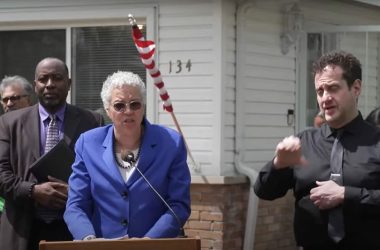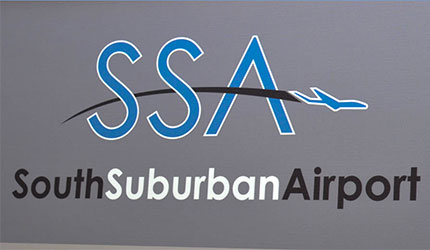New Airport will Create Thousands of Construction Jobs and Make Huge Economic Impact on Region
UNIVERSITY PARK–(ENEWSPF)–July 25, 2013. After years of working to make it a reality, Governor Pat Quinn today signed a law that will give the Illinois Department of Transportation (IDOT) the power to build the South Suburban Airport. Located in Will County, this new global transportation hub will employ more than 11,000 construction workers to build the airport and 14,000 people when operational. The new law – which was applauded today by elected officials, labor, and community leaders – gives IDOT the power to enter into a public-private partnership for the development, construction and operation of the airport.
Today’s action delivers on Governor Quinn’s commitment to develop a third major Chicago regional area airport in the south suburbs, one of his priorities since taking office.
“From day one, I have fought to make the South Suburban Airport a reality in Will County,” Governor Quinn said. “Today, I am happy to say that our hard work and commitment to getting the job done has paid off. Now we can move forward with the development of this major economic engine that will strengthen our status as the transportation hub of the nation while creating thousands of good-paying jobs in Illinois.”
Over the past several years, Governor Quinn has worked to secure numerous approvals from the FAA, millions of capital dollars for land acquisition and thousands of acres to build the airport. Senate Bill 20, sponsored by State Senator Toi Hutchinson (D-Chicago Heights) and State Representative John Bradley (D-Marion), authorizes IDOT to enter into a public-private partnership to develop, finance, construct, manage, operate and maintain the South Suburban Airport. The law requires IDOT to collaborate with all units of local government and private entities that are impacted by the airport, and sets up a transparent public process to build the facility and select a firm to operate the airport. The agreement also streamlines the process to acquire the land necessary for the airport’s development.
Illinois has invested about $40 million to date on land acquisition. Governor Quinn’s Fiscal Year 2014 budget also includes the remaining $71 million needed to complete land acquisition for the inaugural footprint.
“There have been talks about constructing a south suburban airport for over 40 years, this will move the process forward,” State Senator Hutchinson said. “The airport will bring steady jobs and economic development to the Southland. Once operational, the airport will ensure the growth of our local economy.”
“Building this airport is an essential step in enhancing the Southland’s global profile and strengthening our local economy,” U.S. Congresswoman Robin Kelly (D-IL) said. “I’d like to thank Governor Quinn, the General Assembly and the many local officials whose work turned the vision of a third airport into a reality. I look forward to working closely with all parties to ensure that we build a first-class facility that improves our communities, employs local people and makes us all proud.”
“The South Suburban Airport is the kind of large-scale project needed to provide an economic jolt to Will County,” State Representative Larry Walsh (D-Elwood) said. “The construction and operation of this airport will help bring thousands of steady, well-paying jobs to our area and boost the regional economy. I look forward to breaking ground on this historic project, and I will continue to support measures that put local families back to work.”
Will County is the ideal location for the South Suburban Airport because of its existing major highway and railroad infrastructure, its growing population and the nearby presence of many global logistics firms.
The aviation industry already has a $40.9 billion annual economic impact in Illinois, and 337,000 jobs can currently be traced back to aviation in the state. Those numbers will grow substantially once the South Suburban Airport is operational. Jobs will be created for construction workers to build the airport, and once complete, employees will be hired for airport and airline operations, cargo, security, concessions, trucking and logistics, restaurants, hotels, rental car businesses and retail establishments.
“The South Suburban Airport is uniquely positioned to capitalize on and contribute to the region’s growth by offering a flexible and convenient multi-modal solution for businesses and passengers alike,” IDOT Secretary Ann Schneider said.
IDOT has produced an Airport Master Plan for the South Suburban Airport that is now under review by the Federal Aviation Administration (FAA). This master plan will be used to create the facility, and officials expect full FAA approval within a few months. The airport site comprises about 5,800 acres, with about half of the land already acquired under the governor’s leadership. The airport could eventually encompass about 20,000 acres including land necessary for access roads and noise abatement. Governor Quinn recently spoke to U.S. Department of Transportation Secretary Anthony Foxx to ask that the FAA expedite review and approval of the remaining chapters to ensure that this project can move forward quickly.
Illinois is also partnering with the state of Indiana to construct the Illiana Expressway, a new 50-mile highway stretching from I-65 in Indiana to I-55 near Wilmington in southern Will County. When built, the Illiana Corridor Project will reduce the strain of truck traffic on local roads, thereby improving safety, travel times and job accessibility. Potential economic benefits include the creation of more than 9,000 construction jobs and more than 25,000 long-term jobs. The selected Illiana route will provide access to the South Suburban Airport once both projects are completed.
For more information about the South Suburban Airport, visit www.SouthSuburbanAirport.com.
Senate Bill 20 also contains economic development provisions for other parts of Illinois. The law is effective immediately. These include:
Allows construction of an arena near McCormick Place for DePaul University sporting events and for small- to medium-sized conventions.
Amends the property tax code so farmland property taxes are based on the income potential for the individual piece of farmland, rather than on a statewide average productivity of all farmland.
Allows new or expanded fertilizer plants to be eligible for state job-creation incentives, with a minimum of 125 jobs created.
Assists with the development of the Port of East St. Louis along the Mississippi River.
Source: illinois.gov









